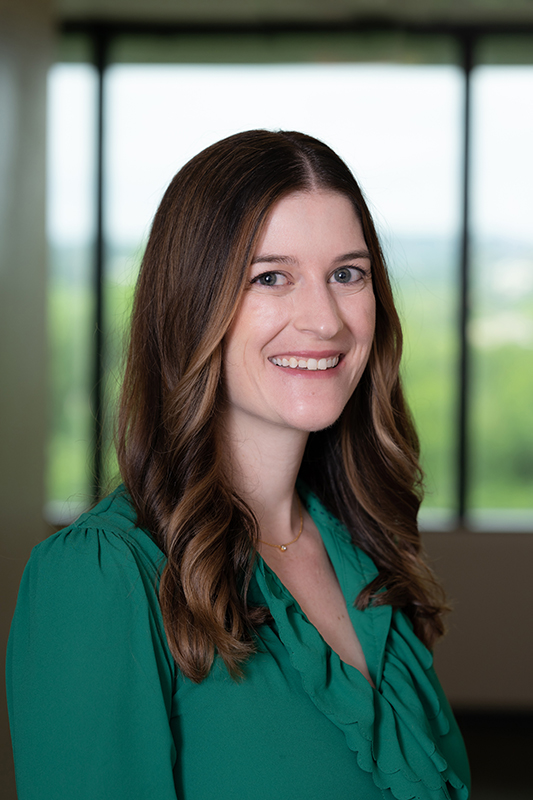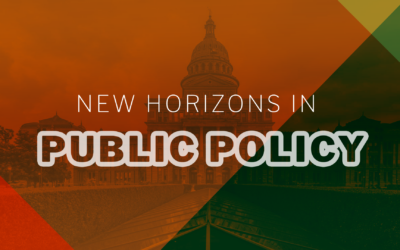2024 Impact Report
Shaping the Future of Mental Health Policy
Advancing Mental Health Policy in Texas
In the dynamic landscape of mental health policy, the Hogg Foundation’s Policy Unit has shown a steadfast commitment to advancing mental health equity in Texas through strategic initiatives and innovative projects. Over the past two years, the Policy Unit has undergone significant transformations, including the conversion of our Mental Health Guide from a traditional print publication into an interactive website, and focusing the next cohort of Policy and Peer Policy Fellows on a children, youth, and families policy theme to better support collaboration.
These changes reflect the Foundation’s dedication to adapting to community needs while staying true to its core mission.
For this Impact Story, we reached out to Alison Mohr Boleware, Director of Policy for the Hogg Foundation, and Doug Smith, the newly appointed director of the Hogg Policy Academy, to gather their insights on current challenges and future opportunities.
Peer Policy Fellow grantee partners:
- Asian Texans for Justice
- Coalition of Texans with Disabilities
- Mental Health America of Greater Houston
- National Alliance on Mental Illness – Texas
- Texas Civil Rights Project
Policy Fellow grantee partners:
- Disability Rights Texas
- National Association of Social Workers Texas
- Texans Care for Children, Inc.
- Texas Assn. of Community Health Centers
- Texas Counseling Association
- Texas Pediatric Society
Photos from Policy Fellows and Policy Academy events
Embracing Change, Preserving Purpose
“This is embracing a big change while also preserving the original purpose of the Guide: to educate as many people as possible about the mental health system in Texas,” says Alison. “Having a web version will get more eyes on the Guide’s content and keep us up to date with trends. We are excited to see the reach of the new Guide website.”
Another significant change implemented by the Policy Unit was the thematic shift in the Hogg Policy Academy and Fellows initiative, emphasizing support for children and families, particularly in Central Texas.
“Rather than charging the Policy Academy with covering every mental health issue in depth, which we’ve learned is nearly impossible, we were drawn to the potential benefits of a shared topic of interest among the participants,” Alison explains. “Fellowship is an important part of the Policy Fellows program, and having a common agenda around a shared focus will enhance the fellowship experience.”
New Leadership
“One of the biggest surprises has been how much excitement there is for policy and advocacy work in the grantee partner space,” she notes. “Sometimes it’s hard to get out of the policy mindset and remember that individuals themselves are the ones who drive policy change. It’s refreshing to talk to grantee partners who want to engage in this work.
“Every meeting ends with an action item: someone meeting with a legislator, an upcoming testimony opportunity, or even navigating parking at the Capitol for an upcoming visit. I was hopeful when I started that we could build capacity for communities to engage in policy, so this has been a very welcome surprise.”
Doug Smith is even newer to his role, having joined as Policy Academy director in the summer of 2024. With over two decades of experience in public policy teaching, analysis, and advocacy, he aims to provide leadership development training for certified peers and family partners across five states.

Alison Mohr Boleware, Hogg Director of Policy
“My core value is that the time I spend investing in others is the best use of my time,” Doug states. His extensive background includes serving as an Adjunct Professor of Social Welfare Policy at The University of Texas at Austin and leading campaigns focused on mass incarceration and employment opportunities for justice-involved individuals.
As Policy Academy Director, Doug’s primary task is to create and teach a robust curriculum of shared learning opportunities for the Policy and Peer Policy Fellows to engage in the policymaking, advocacy, and systems change efforts, as well as build their professional development skills. “I know the challenges, disappointments, opportunities, and excitement of policymaking at the state level,” he says. “I want the Fellows to fully experience all of this, expanding their skills and connections to become recognized and trusted policy practitioners. Most importantly, I want them to step into leadership roles in mental health policy.”

Alison Mohr Boleware, Maddie Garza, Shannon Hoffman
Small But Mighty
Despite its small size, the Policy Unit has a packed agenda. Alison describes her approach to ensuring every issue receives necessary attention while setting priorities.
“There is never a shortage of work!” she exclaims. “As a team of three, we can’t devote the necessary time to each issue and still get enough sleep, so we’ve been strategic about prioritizing our issues and defining our roles.”
Effective policy work relies heavily on collaboration, so the Hogg Foundation Policy Unit has forged strong partnerships and participates in various coalitions comprised of dedicated individuals.
“This collaborative approach allows us to focus our energy on issues where we have expertise and that matter to our grantee partners,” Alison explains.
“The policy prioritization process involves assessing the current mental health and substance use landscape in Texas and identifying solutions to address existing gaps and barriers,” she continues. “We take direction from grantee partners to better understand the challenges within their communities and the solutions needed to support their mental health and well-being.”
Another important realization for Alison and the Policy Unit is that Hogg doesn’t need to lead on every issue but can serve as a convener, collaborator, connector, or strategist.
“Hogg receives many requests from various people and organizations. One of my biggest—and toughest—jobs has been figuring out when to engage versus when to step back,” Alison shares. During the last legislative session, youth and student mental health emerged as a major concern for grantee partners. Consequently, the Policy Unit focused on legislation and funding related to creating safe and supportive schools, allowing them to engage with new stakeholders and respond to legislators’ interests.
Looking to the Future
As Alison and her team look ahead to 2026-27, they have set ambitious milestones. “We’ve been reimagining some of our major projects,” she shares. “We’re excited to see our Guide as a website, to enhance our Policy Fellows program through a themed issue area of focus, and to continue supporting our grantee partners in understanding policy and advocacy. We want them to feel empowered and confident in their policy work and to build stronger relationships with their state representatives.”

Hogg Policy Fellows
Doug has his own set of goals. “The first priority is to ensure that the Policy Academy provides the knowledge and skills the Fellows need to succeed in state-level policymaking,” he states. “Every session is carefully designed to provide the right amount of content, application, and coaching, all timed at the right point in the legislative calendar to be most relevant to the Fellows and their organizations. I work closely with the Hogg Foundation, Texans Care for Children, and the Academy Mentors and Fellows to co-design this experience.”
Doug also emphasizes the importance of fostering a sense of community among the Fellows and Mentors, creating valuable connections and a support network throughout their two-year experience.
The Hogg Policy and Peer Policy Fellows program is one of the Foundation’s longest-running initiatives and a highly respected incubator of mental health policy capacity in Texas. Academy alumni are leaders in mental health policy and advocacy, many running their own organizations or leading policy initiatives.
“The last two years have been a period of growth and transformation for the Policy Unit,” says Alison. “As we continue to evolve and adapt, we will remain a beacon of hope for those in need and a driving force in shaping public policy to improve mental health outcomes for all Texans.”
Related Content
Rising Voices: Telling Your Story
When personal stories are shared with policymakers, not only do they draw attention to important issues, but they also resonate in ways that facts and data alone cannot.
Hogg Foundation to Conclude Successful Policy Initiatives, Leaving a 16-Year Legacy of Legislative and Policy Impact
The Hogg Foundation for Mental Health will conclude its Policy Academy (HPA), Policy Fellow Grants (PFG), and Peer Policy Fellow Grants (PPF) initiatives in 2026, leaving a lasting legacy of legislative and policy impact.
Youth Voice at the Capitol
View photos and videos of youth from Students Engaged in Activating Texas (SEAT) convening at the Texas Capitol for a day of advocacy.
Become a Hogg Insider
When you subscribe and follow the Hogg Foundation for Mental Health, through our newsletters or social media channels, you can get mental health news and resources, funding announcements, and more delivered right to your inbox and on your feed.






